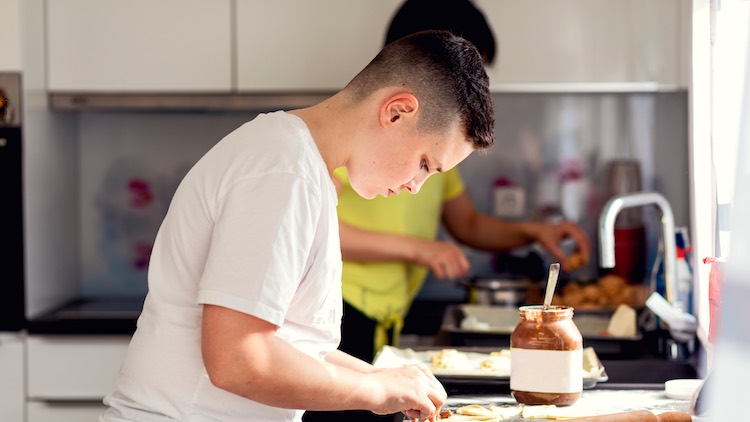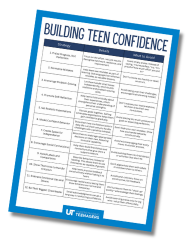Teenage anger can erupt unexpectedly, transforming an ordinary day into a battlefield of harsh words, cold silences, or doors slammed in frustration. It’s an emotion that can leave parents feeling frustrated, worried, or even afraid—wondering where all this rage is coming from, and whether it’s normal or a sign of something more serious. (Bonus points if it happens just as you’ve finally sat down with a cup of tea.)
Anger in teenagers isn’t simply about bad moods or typical teenage rebellion. It can be intense, confusing, and at times deeply personal, especially when harsh words or cold silences are directed at the people trying hardest to help. And while it’s normal for teenagers to have strong feelings, knowing how to recognise, understand, and respond to those feelings makes all the difference for both your teenager’s wellbeing and your relationship with them.
This article is for parents trying to navigate that storm. We’ll look at why teenage anger happens, how to tell when it’s part of normal development and when it might signal deeper issues, and most importantly, how parents can respond in ways that help rather than escalate the conflict.
Because while teenage anger can feel overwhelming, it doesn’t have to define your relationship—or your teenager’s future.
Part One: Understanding Teenage Anger
Teenage anger can be confusing and sometimes overwhelming, both for teenagers experiencing it and for the parents trying to navigate it. Before looking at ways to help, it’s important to understand what teenage anger really is, why it happens, and how it differs from other kinds of anger.
This first part of the article explores the nature of teenage anger—and how to tell the difference between normal teenage turbulence and signs that something more serious might be going on.

What is Teenage Anger?
Teenage anger has quite a cocktail of causes — rapid brain development, hormonal surges, school or friendship stress, and that ever-present drive for independence. In other words, a perfect storm for fireworks. Strong feelings are a normal part of adolescence, but when anger shows up as a regular houseguest — or worse, one that slams your doors and trashes the bedroom — it can sometimes signal something deeper, like anxiety or depression.
For a lot of parents I talk with, this is one of the most confronting parts of raising a teen. The moodiness we can handle. The dramatic sighs? Annoying, but fine. But the full-blown rage or the silent freeze-out? That’s when even calm parents find themselves wondering, What just happened? Or, if we’re honest, thinking, Is it too early for a glass of wine?
The thing to remember is that teenage anger isn’t just random explosions. It’s often a sign they feel blocked from something important, misunderstood, threatened, or treated unfairly. Anger can erupt suddenly, or simmer under the surface for days, making the whole house feel like it’s tiptoeing around a sleeping bear. It’s normal for teens to feel this stuff, but the way it comes out can feel way out of proportion.
An important consideration is that anger is rarely the whole story. What we see is often just the tip of the iceberg. Beneath it there’s usually a swirling mess of fear, shame, sadness, or plain helplessness. And rather than admit to feeling vulnerable, teenagers often find anger feels safer — like putting up a big “back off” sign rather than letting anyone see they’re hurting.
This is why teenage anger can feel so baffling. To parents, it might look like fury over nothing — a curfew, a tone of voice, or a sibling breathing too loudly. But to the teen, it’s covering something they can’t make sense of, or don’t trust anyone enough to share. Many teens learn early on that showing sadness or fear leaves them feeling weak or exposed, so anger becomes the easier, louder mask.
It’s also worth saying that anger isn’t the same as moodiness. Teen mood swings are famous — the heavy sighs, the silent dinner table, the sudden retreat to their room. Annoying, yes, but usually short-lived. Anger is different. It’s louder, longer, and harder to ignore — whether it’s a slammed door, a heated argument, or an icy silence that makes the dog nervous.
And it doesn’t always look like shouting. Some teenagers unleash the full verbal fireworks, while others shut down entirely — sullen, sarcastic, or just gone behind a wall of silence. Both versions are real, both can be intense, and both need attention.
The key is remembering that teenage anger usually points to something deeper. It’s not just “bad behaviour.” Spotting the different ways it shows up, and realising it might be a cover for more vulnerable feelings, is the first step to responding in ways that actually help, rather than pouring petrol on the fire.
Developmental Differences
One big difference between kids and teenagers when it comes to anger is how their brains and emotional skills are built. Young children’s tantrums are usually short, loud, and spectacular. They are still learning how to handle big feelings and often don’t have the words to explain why they are upset. Their meltdowns are all impulse, no filter, and once the storm passes, so does the fury. Sometimes a nap fixes everything. If only that worked for teenagers, though most parents would happily volunteer them for it.
Teenagers bring more brain power to the table, which sounds like it should make life easier. Often it doesn’t. Their anger usually comes from layered frustrations, like feeling misunderstood, treated unfairly, restricted, or embarrassed. They are no longer raging because someone cut their sandwich into triangles instead of squares. Their anger is tied to a growing need for independence, a budding sense of justice, and a still-wobbly sense of who they are.
Teenagers can also hang on to anger far longer than young children. While a child might have a meltdown and bounce back before you have even had time to sigh, a teenager can replay an argument in their head for hours, days, or even weeks. They stew, they brood, and they occasionally deliver dramatic sighs that could win awards for sheer volume and length. For parents who were used to conflicts blowing over quickly when their kids were small, this lingering resentment can feel like stepping into a soap opera with no end credits.
Cognitive Capacity
The way teenagers think is another important difference. Little kids tend to see life in black and white. If they can’t have what they want, it feels like the end of the world, at least for ten minutes. Teenagers are wired for more complex thought. They reflect on situations, imagine different outcomes, and think deeply about fairness, identity, and relationships.
That deeper thinking means teenage anger often has extra layers. The argument about a curfew might not really be about the curfew at all. It could be about feeling treated differently than a sibling, or feeling unsure about where they fit in with their peers. What feels like a simple rule to a parent can feel like a grand betrayal to a teenager.
While teenagers can think in complex ways, they don’t yet have the life experience adults use to keep things in perspective. We have had years to remind ourselves that bad days pass, people say things they don’t mean, and most problems are not actually the end of the world. Teenagers don’t have that backlog of experience to lean on, so a comment from a friend, a bit of criticism from a teacher, or a household rule can feel like a devastating blow rather than a passing frustration.
This is why teenagers can switch so quickly. One moment they seem calm and reasonable, and the next they are swept up by feelings that feel enormous. They are developing the ability to analyse situations, but they are still learning how to handle the emotions that come with them. The result is a kind of anger that feels bigger, stickier, and far less predictable than the kind adults are used to.
So teenagers end up in this strange in-between place. One moment, they sound almost adult, talking through something calmly and logically. The next, they’re swept up in a wave of emotion so strong it feels like the world is ending because someone used the “wrong” tone of voice. They can think like adults, at least some of the time, but they don’t yet have the emotional handbrake that lets adults pause, breathe, and realise they probably won’t still be furious about this in the morning. That mix of big thoughts, even bigger feelings, and not quite enough tools to balance the two, is what makes teenage anger feel so much bigger and far less predictable than the kind we’re used to handling as adults.
Why Are Teenagers So Prone to Anger?
Teenagers have all the raw ingredients for fiery tempers. Rapid brain changes, hormone surges, social stress, and the constant tug-of-war for independence create a perfect recipe for drama. Their brains process emotions like they’re on surround sound, which can make even a small issue feel enormous.
Anger is a normal part of adolescence, but when it feels constant or extreme, it can sometimes point to deeper struggles like anxiety or depression.
Parents often find themselves staring at their teenager, wondering how the once-sweet child has been replaced by someone who looks ready to explode because you asked them to empty the dishwasher. Teenage anger can feel intense, unpredictable, and, at times, a little frightening. But there are reasons this stage is so primed for tempers to flare. It isn’t just “bad behaviour.” It’s the collision of fast-changing brains, hormones, identity crises, and a world that can feel overwhelming — especially when you add parents into the mix.
Adolescent Brain Development
A big reason teenagers are so prone to anger lies in the way their brains are wired during adolescence. The limbic system, which is the part of the brain that drives emotions, is fully online and running at full speed.
Meanwhile, the prefrontal cortex, which is the bit responsible for impulse control and rational thinking, is still under renovation and won’t be finished until their mid-twenties.
That combination means teenagers feel emotions intensely but often can’t pause to think before reacting. Toss in the occasional hit of dopamine, the brain’s “reward chemical,” and you’ve got a system that’s built to chase highs, avoid discomfort, and sometimes lash out when frustrated. Or when someone looks at them the wrong way.
Sensitivity to Emotional Cues
Teenagers also have a kind of built-in radar for emotional slights, even when none are there. Studies show they’re more sensitive than adults to facial expressions of anger or disapproval, and they’re more likely to misread a neutral face as hostile.
This is why a single raised eyebrow, or the way you sighed when asking them to put their shoes away, can suddenly become “You’re always angry at me!” territory. To a parent, it can feel baffling. To a teenager, that eyebrow can feel like a full-blown attack and be enough to spark a defensive, angry reaction.
Hormonal Surges
Hormones are another powerful ingredient in the teenage anger mix. During adolescence, levels of hormones like oestrogen, testosterone, and cortisol surge dramatically. These hormones don’t just influence physical changes — they also affect mood, stress reactivity, and emotional sensitivity.
While hormones don’t directly cause anger, they can crank up the volume on everything. A minor disappointment can feel devastating, and a small disagreement can escalate into shouting that leaves everyone wondering how “We’re out of bread” became a declaration of war.
Sleep Deprivation and Shifting Body Clocks
Another often overlooked factor in teenage anger is sleep, or rather, the lack of it. During adolescence, the brain’s production of melatonin (the hormone that signals sleepiness) shifts to a later time in the evening. This natural delay in the body clock means teenagers often can’t fall asleep until late, yet still have to wake up early for school.
As a result, many teenagers are chronically sleep-deprived. Lack of sleep directly affects emotional regulation, making teens more prone to irritability, frustration, and explosive reactions. A teenager who might handle a disappointment calmly when well-rested can spiral into anger or tears when exhausted.
Parents sometimes misread this irritability as purely behavioural, but often, it’s driven by biology and exhaustion. (Though admittedly, biology is hard to remember at 6am when someone’s yelling that school is “pointless.”) Helping teens protect their sleep — even if it means negotiating screen time and bedtime routines — can make a significant difference in reducing angry outbursts.
Identity Formation and the Need for Autonomy
Teenagers are in the middle of a huge developmental shift. Their brains and bodies are changing fast, and so is the way they see themselves in the world. They’re trying on identities, testing out opinions, and fiercely guarding their new sense of independence. To them, every choice — from what music they like to who they sit with at lunch — feels like part of declaring who they are.
The “testing beliefs” stage is often where things get… interesting. One week they’ve decided capitalism is evil and dinner should only ever be plant-based, the next they’re lobbying for a steak on the barbecue because they’ve moved on to a “high-protein phase.” None of it is permanent, but all of it feels deeply serious to them.
Against that backdrop, even a gentle parental boundary can set off a storm. A calm “Not tonight” about a sleepover can feel less like a scheduling issue and more like, “We don’t trust who you’re becoming.” That’s when your teen’s anger is ofter triggered.
They aren’t trying to defy you for fun (though there’s sometimes a bit of that). It’s how they stake their claim over who they are and test out who they’re becoming — even if it drives everyone else to distraction.
Social and Environmental Stressors
Today’s teenagers are juggling more pressures than most adults would willingly take on. School demands, shifting friendships, part-time jobs, and the constant buzz of social media all layer on top of each other. It’s a lot for anyone, but especially for someone whose brain is still figuring out how to balance big emotions and perspective.
Social media deserves its own special mention. Social media keeps teens connected, and also turns their social lives into something like a never-ending talent show, with everyone watching the votes come in.
A single comment, a lack of likes, or finding out via a group chat that everyone else is hanging out can hit like a punch to the gut. For adults, it might feel petty. For a teenager, it can feel like a direct hit to their sense of belonging — and when belonging feels under threat, the anger switch flips fast.
Part of that is because identity, at this age, is still under construction. Being excluded or criticised doesn’t just sting in the moment. It can feel like an existential crisis: Am I weird? Do they all hate me? What does this say about me? That panic often comes out as anger, because anger feels more powerful than admitting fear or hurt.
And while most teens bounce back eventually, the sheer intensity of that moment with the slammed doors, the sharp words, the general air of “life is over,” means parents can easily forget just how deeply it cuts. To them, this isn’t just a social setback. It feels like their whole place in the world is at stake.
Family Dynamics and Learned Behaviour Patterns
Then there’s life at home, which can act like fuel or water on the fire. Teenagers tend to absorb the emotional climate of their family without even realising it. If arguments regularly involve shouting or week-long silences, chances are they’ll learn to communicate the same way. If the default is calmer conversations and problem-solving, they’re more likely to copy that too — even if it takes a few tries.
Anger also has a way of popping up in the classic parent-teen tug-of-war. Teens are wired to push for independence, and parents are wired to keep some order, and when those two instincts meet, sparks tend to fly. What starts as a simple disagreement over curfew can spiral into a full-scale standoff, with both sides convinced they’re the only reasonable one in the house.
Emotional Confusion: “I’m Angry but I Don’t Know Why”
Sometimes, teenagers don’t even know why they’re angry. They’re still figuring out how to identify and name their emotions, so what bursts out as rage might actually be sadness, anxiety, or embarrassment.
That’s when you hear things like, “Leave me alone!” or, “You don’t understand me!” (and the ever-reliable, “Everyone else’s parents are so much easier than you”). It isn’t always avoidance. More often, it’s genuine confusion — they feel something huge but can’t yet pin it down or put it into words.
And anger, unlike those other feelings, is easy to grab. It’s basically the low-hanging fruit of teenage emotions. Being angry feels powerful, it pushes people away, and it doesn’t require awkward personal conversations about fear or hurt. If emotions were tools in a shed, anger would be the hammer — not subtle, not elegant, but easy to swing around when you don’t know what else to do.
Teenage anger, in short, is the product of a perfect storm: developing brains, shifting hormones, identity struggles, external pressures, and the normal turbulence of growing up. Understanding these factors doesn’t make the outbursts pleasant or more tolerable, but it can help parents approach their angry teens with greater patience, empathy, and confidence.

What Are Signs Teenage Anger Might Be Serious?
Teenage anger may be serious if it includes violent threats, self-harm, extreme withdrawal, or rage that doesn’t subside. Changes in sleep, appetite, or school performance can also signal deeper mental health issues like depression, anxiety, or trauma.
Few things weigh as heavily on a parent’s heart as wondering whether their teenager’s anger is normal—or a sign that something far more serious is going on.
It’s a frightening place to be. One moment your teen seems like their usual self, the next they’re glaring, yelling, or withdrawing into a silence so thick it feels impenetrable. You find yourself lying awake at night, replaying arguments, worrying that you’ve missed something important, or fearing that this is more than just teenage moodiness.
Let’s be very clear: anger is a normal part of adolescence. But there are also times when anger becomes a warning light—a sign that your teen is struggling with something deeper and may need more help than you alone can provide.
This section will help you understand the difference between what’s typical and what may indicate more serious issues. Knowing the signs can be the first step in getting the right support—for your teenager and for yourself.
What’s Normal Teenage Anger?
Anger during the teenage years is completely normal and, in many ways, developmentally appropriate. Teens are dealing with an avalanche of physical changes, social pressures, shifting friendships, and new responsibilities. Their brains are still under construction, making emotional regulation harder than it is for adults.
In normal teenage anger, you might see your teen:
- Raising their voice or arguing during conflicts
- Slamming doors or stomping off
- Giving you the silent treatment for a few hours
- Showing emotional outbursts tied to clear triggers, like disagreements about freedom, friendships, or school stress
These moments, while often stressful, tend to blow over. Even if words are said in anger, your teenager usually returns to baseline functioning—they go to school, engage with friends, and show interest in activities. Occasional fights, sulks, or slammed doors are not necessarily signs of a deeper problem.
The key is that normal teenage anger:
- Is episodic, not constant
- Resolves with time or conversation
- Doesn’t consistently involve threats, violence, or self-harm
- Allows your teen to maintain daily life and relationships
While all of this might reassure you that teenage anger can be messy but typical, it’s equally important to know that sometimes anger goes beyond normal teenage turbulence. There’s a line between typical outbursts and signs that a teenager is struggling with deeper emotional distress or mental health challenges.
Knowing where that line sits can be difficult, especially because even normal teenage anger can look dramatic. But certain behaviours stand out as red flags—signals that your teenager’s anger might be masking something more serious, or that they’re finding it impossible to cope without help. Let’s look at those warning signs in more detail.
Aggression and Violence
While some heated arguments are normal, physical aggression or violent behaviour is not typical teenage angst. This includes hitting, pushing, throwing objects, breaking possessions in rage, or threatening harm. Unlike a shouted argument, aggression reflects a deeper struggle with managing intense feelings—and may signal significant emotional distress or an underlying mental health issue.
Parents sometimes hope aggressive behaviour will “blow over,” but persistent violence tends to escalate without help. If your teenager’s anger frequently becomes physical, it’s important not to dismiss it as “just hormones” or teenage rebellion. Such behaviour deserves prompt attention from professionals who can help your teen develop safer, healthier ways to cope with overwhelming emotions.
Self-Harm and Talk of Suicide
Another urgent red flag is anger that turns inward. Self-harm is never a normal part of teenage development. Some teens cope with emotional pain by harming themselves physically—cutting, burning, hitting themselves, or engaging in risky behaviours that put their safety at risk.
This is often because they feel trapped, ashamed, or unable to express what’s really going on inside. They might not even identify their behaviour as self-harm; instead, it becomes a release valve for unbearable feelings.
Equally concerning is any talk of wanting to die, feeling worthless, or believing the world would be better off without them. Even if said in anger, these statements should always be taken seriously. If you hear words like “I don’t want to be here anymore” or “No one would miss me,” seek professional help immediately. You’re not overreacting—you’re protecting your child’s life.
Persistent, Intense Rage
Most teenagers lose their temper occasionally. But when anger is intense, constant, and seems out of proportion to events, it may signal deeper trouble. This might look like explosive outbursts over minor issues, constant irritability, or an ever-present edge of hostility.
Some teens caught in persistent rage find it nearly impossible to calm down, even hours after the initial trigger. Parents may feel like they’re walking on eggshells, afraid of setting off another episode. Unlike normal teenage mood swings, this level of anger doesn’t subside easily and often disrupts the teen’s ability to function at school, maintain friendships, or engage in daily life.
If your teen seems permanently angry, and nothing you do seems to de-escalate the situation, it’s worth seeking support. Persistent rage is a sign that something deeper may be driving their distress.
Disproportionate Reactions
It’s normal for teenagers to be dramatic at times—emotions run high, and small disappointments can feel enormous in the heat of the moment. But when a teen’s reaction regularly seems wildly out of proportion to the situation, it can be a sign of deeper turmoil.
A slight change in plans might provoke a torrent of shouting or tears, or a gentle suggestion might be met with accusations of hatred or betrayal. These extreme responses often hint that the issue isn’t really about the immediate situation but tied to bigger feelings brewing beneath the surface—fear of rejection, shame, or a sense of worthlessness.
Parents can feel bewildered when minor conflicts escalate so quickly, leaving everyone hurt and confused. It’s important to remember that while occasional overreactions are part of adolescence, persistent and intense responses that disrupt everyday life warrant closer attention. Such disproportionate anger can sometimes indicate underlying emotional struggles that need understanding and support.
Withdrawal and Isolation
While it’s perfectly normal for teenagers to crave more privacy and alone time, there’s a significant difference between needing space and becoming completely withdrawn. When a teen isolates themselves to the point of cutting off family and friends, refusing conversations, and losing interest in activities they once loved, it’s often a sign of deeper emotional struggle.
Some teens retreat because they’re overwhelmed by shame, fear, or a sense of hopelessness. Others withdraw to avoid situations they feel unable to handle, such as school stress or social anxiety. Parents might notice their teenager spending long hours behind a closed bedroom door, responding with one-word answers, or appearing emotionally distant even during family events.
Persistent isolation isn’t simply “teenage moodiness.” It often signals that your teenager is hurting in ways they can’t put into words. Early intervention can help bring them back from the brink of loneliness and despair.
Changes in Sleep, Appetite, or School Performance
It’s not unusual for teenagers to experience shifts in sleeping and eating patterns. Growth spurts, busy schedules, and social lives can all disrupt routines. But significant, ongoing changes in sleep, appetite, or how they perform at school can be indicators that something deeper is happening.
A teenager who suddenly can’t sleep, or who sleeps excessively and still wakes up exhausted, might be grappling with emotional distress. Similarly, changes in appetite—eating far less or far more than usual—can reflect internal turmoil. School performance often takes a hit too, with dropping grades, skipping classes, or a complete loss of interest in subjects that once mattered to them.
These changes don’t automatically mean a teenager has a mental health disorder. But when shifts are pronounced, persistent, and accompanied by anger or withdrawal, they suggest a teen may be struggling with feelings or challenges they can’t manage alone. Recognising these patterns can help parents respond with curiosity and compassion, rather than frustration.
Links to Mental Health Issues
When teenage anger shifts from occasional outbursts to persistent patterns, it’s often a symptom of deeper emotional or mental health struggles. Anger isn’t always the root problem—it can be a sign that a teenager is battling feelings they can’t explain or control.
For some teens, anger masks depression. Many people think depression looks like sadness, but in teenagers, it often shows up as irritability, hostility, or persistent rage. Others might lash out in anger because of anxiety, feeling trapped or overwhelmed in situations that seem ordinary to everyone else. Traumatic experiences can also leave teenagers emotionally raw, with anger acting as a shield against vulnerability.
Neurodevelopmental differences like ADHD or autism spectrum conditions can further complicate how teenagers process emotions. These conditions don’t “cause” anger outright, but they can make it harder for teens to regulate feelings and reactions, leading to more frequent or intense outbursts. Substance use, too, can lower inhibitions and amplify emotional responses.
It’s essential for parents to remember that these connections don’t mean something is irreversibly “wrong” with their teenager. They simply highlight that persistent anger might be a clue that a young person needs more support and understanding. Knowing this can help parents replace blame or fear with compassion and informed action.
A Final Note on Understanding Teenage Anger
As you reflect on all these signs, it’s vital to remember that teenage anger doesn’t always look the same. Some teenagers are loud and explosive, slamming doors, yelling, and leaving no doubt that they’re furious. Others keep their anger locked inside, becoming quiet, withdrawn, or icy in their silence. Just because a teenager isn’t shouting doesn’t mean they’re not deeply angry—or hurting.
Equally, a teenager who occasionally explodes in frustration isn’t necessarily “an angry teenager.” Adolescence is a time of intense emotions, and sometimes an outburst is simply a momentary release, not a sign of something deeper.
One of the biggest challenges for parents is discerning when anger is a passing storm—and when it’s a signal of something more significant beneath the surface. Often, the anger we see is just the tip of the iceberg, hiding emotions like fear, shame, sadness, or a feeling of powerlessness.
Understanding this complexity doesn’t mean ignoring anger or excusing hurtful behaviour. But it does mean approaching teenage anger with curiosity and compassion, remembering that even the fiercest outburst may be a cry for help—or an attempt to cope with feelings your teenager can’t yet express in words.
Part Two: How Can Parents Respond to Teenage Anger?
Understanding teenage anger is one thing. Dealing with it in real life is something else entirely. Even when you know the reasons behind it, facing your teenager’s outbursts, silence, or simmering resentment can still feel overwhelming — and sometimes deeply personal.
Parents often want to know how to respond in a way that doesn’t make things worse — and that helps their teenager learn to handle anger more constructively.
Parents can respond to teenage anger by staying calm, validating feelings, setting clear boundaries, and avoiding escalation. Teaching teens coping skills, watching for warning signs, and seeking professional help when anger turns extreme are key ways to protect both teens and family relationships.
This next part of the article focuses on those practical responses — for parents who are living with the reality of teenage anger and looking for ways to handle it day to day.

1. Stay Calm and Avoid Escalation
When your teenager’s anger explodes, your own emotions can flare up in seconds. It’s deeply human: anger often triggers anger in return. But one of the most powerful tools you have as a parent is the ability to stay calm — even when your teen is not.
Remaining steady means refusing to add fuel to the fire, even if your teenager’s words or behaviour feel disrespectful or hurtful. Yelling back, slamming doors, or issuing threats in the heat of the moment can escalate the conflict and leave everyone feeling worse — even if, for about five glorious seconds, it feels like you’ve just pulled off the ultimate boss move.
- One important truth: sometimes staying calm isn’t about feeling calm — it’s about choosing to act calm. Even if your heart is pounding, try to:
- Speak more quietly as your teen’s voice rises.
- Slow down your movements rather than moving quickly or gesturing sharply.
- Keep your face neutral rather than scowling or glaring.
This calm presence helps lower the emotional temperature. It shows your teenager that you’re not going to join the chaos — even when you’re feeling anything but calm inside.
A few practical ways to stay calm:
- Pause before responding. Even a few deep breaths can help you avoid saying things you’ll regret.
- Lower your voice instead of raising it. A softer voice often helps defuse tension.
- Remind yourself that this is about your teen’s struggle — not your failure as a parent.
- Take a time-out if needed. It’s okay to say, “I’m too upset to talk right now. Let’s come back to this in a few minutes.”
Sometimes the best move is simply to script and step away. That means calmly delivering a short, clear statement — then physically removing yourself from the conflict until emotions settle.
For example:
“I’m not ignoring you. I’m giving us space so we don’t say things we regret.”
Or:
“I can see you’re angry. We’ll talk when we’re both calm.”
It’s not easy. You won’t get it perfect every time. But every moment you choose calm over reaction is a step toward creating a safer space for your teen to manage their emotions.
If you want to learn more about how to respond effectively and embed helpful repsonses as a default in your parenting check out my Conflict to Calm Course. In the space of a couple of hours you can learn all you need to know to spot, avoid, and manage teenage arguments and outbursts.
2. Acknowledge and Validate Their Feelings
One of the most powerful ways to diffuse teenage anger — and to preserve your relationship — is to acknowledge and validate your teenager’s feelings.
That might sound obvious, even simplistic. But the truth is, in the heat of an argument, validation is often the first thing to vanish. When your teenager shouts or slams doors, it’s natural to go into defensive mode, firing back with corrections, lectures, or punishments. Yet nothing escalates teenage fury faster than feeling dismissed, misunderstood, or told they “shouldn’t feel that way.”
Validation doesn’t mean agreeing with everything your teenager says. It’s not the same as giving in, condoning bad behaviour, or letting disrespect slide. Instead, it’s simply recognising the emotional reality your teenager is experiencing — even if you don’t agree with how they’re expressing it.
For example, if your teenager screams, “You never listen to me!” the natural urge is to argue back: “That’s ridiculous — I’m always listening to you!” But even if you do listen most of the time, arguing the point in that moment will likely make your teen feel more unheard.
Instead, try saying:
- “I can tell you’re really frustrated because you feel like I’m not hearing your side.”
- “It sounds like you’re upset because this feels unfair to you.”
- “I get that this matters a lot to you, and you’re feeling pretty angry right now.”
These kinds of statements don’t solve the problem instantly — but they do something crucial: they help your teen feel seen and respected. Often, that’s enough to bring the intensity of their anger down a notch, making it possible to talk about solutions later.
A powerful way to help yourself stay calm and validate effectively is to prepare micro-scripts — short, repeatable phrases you can rely on even when emotions run high. For instance:
- “I can see you’re upset. I’ll listen when you’re ready to speak calmly.”
- “We’ll finish this conversation when we’re both calmer.”
- “I’m not ignoring you. I’m giving us both a chance to cool off.”
Having these micro-scripts ready acts like a mental safety net. Instead of improvising in the heat of the moment, you have words you trust — helping you stay measured, respectful, and consistent.
It’s important to note that timing matters. Trying to validate your teenager’s feelings when they’re in full-blown rage isn’t always effective. In the middle of shouting, even well-intentioned validation can sound patronising or fake. Sometimes the best move is simply to give space until emotions settle, then come back with empathy once your teen is calmer:
- “Earlier, you seemed really upset. Can you help me understand what was going on for you?”
- “You were angry about what happened before. I want to know your side.”
Validation also means staying curious instead of assuming you know what’s driving your teenager’s anger. Sometimes the problem isn’t about the immediate argument at all — it’s about feeling lonely at school, stressed about exams, or hurt by a friend. By opening the door gently, you invite your teen to share what’s really underneath the anger.
And if your teenager does start sharing, try to listen without interrupting or immediately fixing the problem. You can always move into solutions later. But rushing into advice can feel dismissive and leave your teen thinking, “They still don’t get it.”
At its heart, validation is about communicating this message:
“Your feelings make sense, even if I don’t agree with your actions.”
When teenagers believe their emotions are safe to express — even uncomfortable ones — they’re far more likely to calm down, engage in problem-solving, and trust that you’re on their side, even when you have to say “no.”
3. Don’t Take It Personally
Few things feel more personal than a teenager shouting, “I hate you!” or accusing you of ruining their life. But as hard as it is to hear, much of teenage anger isn’t truly about you.
Teenagers often lash out at the safest people in their lives — the ones they trust won’t abandon them. Their anger might be fuelled by stress from school, friendship conflicts, body image issues, or internal battles they can’t name. Parents become the lightning rod because teens know, deep down, that the relationship can withstand the storm.
This doesn’t mean you should tolerate abuse or disrespect. But it does mean reminding yourself in heated moments: “This is not entirely about me.”
Some parents find it helpful to repeat a simple mental phrase, like:
- “This is about my teenager, not me.”
- “My job is to stay steady, not to win this argument.”
This small mental shift can help you avoid taking cruel words to heart and maintain perspective through the chaos. It’s about creating an emotional shield — protecting yourself so you can respond calmly rather than getting pulled into the storm.
4. Set Clear, Consistent Boundaries
When faced with teenage anger, many parents feel they have only two options: either clamp down hard to regain control, or back off completely to avoid another explosion. But healthy boundaries aren’t about dominating your teenager — or surrendering to keep the peace. They’re about creating safety and respect for everyone involved.
Boundaries communicate two crucial truths:
- Your teenager’s feelings are valid — but not all behaviours are acceptable.
- You’re the adult — and you’re still holding steady, even when emotions run high.
Teenagers push boundaries for all sorts of reasons. Partly, it’s developmental: they’re testing where limits lie, seeking autonomy, and learning how the world responds to their actions. But teenagers also feel more secure when they know exactly where the lines are — and that those lines won’t shift unpredictably.
A boundary is clear, specific, and calmly stated. For example:
- “It’s okay to be angry. It’s not okay to swear at me.”
- “I’ll listen to you, but not if you’re yelling.”
- “I’m willing to talk about changing the rules, but not when you’re calling me names.”
Boundaries are most effective when delivered without threats or emotional heat. Shouting, sarcasm, or punitive language often fuels more anger and turns the boundary into a power struggle.
Another crucial piece is that rules don’t change during the storm. While it’s tempting to bend a rule “just this once” to avoid conflict, shifting boundaries mid-argument can leave teenagers feeling uncertain — and fuels more testing. Instead, choose a few core rules and stick to them every time, calmly and without fuss. Predictability helps teenagers feel safer, even if they protest.
It’s also important to follow through if a boundary is crossed. That doesn’t mean harsh punishments. It means calmly reinforcing the consequence you’ve set. And when you deliver consequences, try to do it with a tone as neutral as reading the weather forecast. Instead of:
“I’m sick of your attitude — you’re grounded for a week!”
Try:
“Because you shouted at me, you’ll lose phone time for the rest of the evening. We’ll talk again tomorrow.”
Keeping your tone steady prevents a power struggle and shows your teen that consequences aren’t personal — they’re simply the result of choices.
Teenagers often claim boundaries are unfair. “You’re so strict!” or “None of my friends’ parents do this!” (Apparently, every other household on earth lets them stay out till 3am and eat nothing but ice cream for dinner.) But consistency is key. If a rule is enforced one day and ignored the next, teenagers receive mixed messages — and often test boundaries even more.
Boundaries also protect the parent’s well-being. Teenagers’ words can be sharp and hurtful. Setting limits on how you’ll be spoken to isn’t just discipline — it’s self-care. It models for your teen that everyone deserves respect, even in conflict.
At times, a boundary might provoke even more anger in the short term. That’s normal. Holding firm, while staying calm and kind, teaches teenagers that while all feelings are allowed, behaviour has limits — and relationships can survive strong emotions.
Ultimately, boundaries aren’t walls to shut your teenager out. They’re guideposts that help both you and your teen navigate the stormy seas of adolescence with safety, respect, and a clearer path forward.
5. Focus on Solutions, Not Just Punishments
When a teenager’s anger becomes disruptive or disrespectful, the natural impulse is often punishment — taking away privileges, grounding them, or imposing immediate consequences. While consequences have their place, punishment alone doesn’t teach teenagers how to handle anger differently next time.
The goal is to help your teen learn skills to solve problems and manage feelings. After a blow-up, once emotions have settled, try shifting the conversation from blame to solutions:
- “What do you think would help you handle it differently next time?”
- “How could we solve this problem together?”
- “What’s a fair consequence if this happens again?”
Involving teenagers in solutions:
- Helps them feel respected and heard.
- Encourages them to take responsibility for their actions.
- Reduces power struggles and resentment.
This doesn’t mean there are no consequences. It simply means consequences are part of a bigger picture — teaching teens how to cope with anger and repair relationships.

6. Model Healthy Coping Skills as a Parent
When dealing with an angry teenager, it’s easy for parents to feel swept up in the emotional storm. You might find yourself raising your voice, saying things you don’t mean, or feeling utterly drained and resentful. Yet one of the most powerful things you can do for your teenager is model how to cope with strong emotions yourself.
Teenagers are keen observers. Even when they’re rolling their eyes, they’re noticing how you handle frustration, stress, and anger. They learn far more from your example than from any lecture you give them about “calming down.”
Modelling healthy coping doesn’t mean pretending you’re never upset. It’s about showing your teen:
- That adults have big feelings too
- That it’s possible to handle those feelings without hurting others
- How to recover and repair relationships after conflict
For example, if you’ve raised your voice during an argument, you might say:
“I’m sorry for shouting earlier. I was feeling overwhelmed, and that wasn’t okay. I should have taken a moment to calm down first.”
This doesn’t make you look weak. It shows incredible strength and teaches your teen that everyone makes mistakes — and that it’s possible to own them and make amends.
Healthy coping as a parent might look like:
- Taking a few deep breaths before responding when your teen shouts
- Choosing to step away for a few minutes if you feel your anger rising
- Speaking calmly even if your teenager is yelling
- Practising self-care outside of conflict moments — sleep, exercise, connection with friends
None of this means you’ll handle every situation perfectly. No parent does. But every time you choose to stay regulated, repair after losing your cool, or admit when you’re struggling, you’re giving your teenager a roadmap for how to handle their own storms.
7. Teaching Teenagers to Manage Anger
While responding calmly to teenage anger in the moment is vital, there’s another side to this puzzle: helping teenagers proactively learn how to manage their anger.
Many parents think of anger purely as a problem to stamp out — but anger itself isn’t “bad.” It’s a normal human emotion that signals when something feels unfair, threatening, or overwhelming. What truly matters is how anger is expressed. Teens need to learn that while their feelings are valid, certain ways of expressing anger can harm themselves or others.
Helping your teenager manage anger involves several important steps.
First, normalise the emotion. Let them know it’s okay to feel angry. Anger is just information — it’s a sign that something doesn’t feel right. What’s not okay is hurting people, property, or themselves in the process.
Second, help build self-awareness. Many teenagers act before they even realise how angry they are. Teaching them to spot early warning signs — like a racing heart, clenched fists, or the urge to shout — gives them a chance to pause and choose a different response.
Third, explore practical coping strategies. Teens don’t automatically know how to cool themselves down. Parents can help them discover tools that work for them, such as:
- Stepping away for a few minutes to breathe
- Using physical outlets like sports or movement
- Writing feelings in a journal
- Talking to someone they trust
- Using “I” statements instead of blame
Equally important is modelling emotional regulation. When you lose your cool, show how to repair:
“I shouldn’t have shouted. I was feeling overwhelmed. Let’s start over.”
This teaches teens that mistakes are human — and that it’s possible to fix things afterwards.
A helpful principle in moments of high emotion is less talk, more action. When teenagers are raging, long lectures rarely work. Keep your words brief and clear, saving bigger discussions for when things have cooled down.
Helping teens manage anger isn’t a single conversation. It’s an ongoing process woven into everyday life. Some of the best moments for teaching happen after the storm has passed, when both of you are calm enough to reflect and talk about better ways forward.
Finally, remember that helping teens manage anger is not about making sure they never feel angry again. It’s about teaching them how to express that anger safely, respectfully, and in ways that don’t damage relationships.
8. Repair and Reconnect After Conflict
One of the most important steps after teenage anger has erupted is repairing and reconnecting. Just because a blow-up happened doesn’t mean the relationship is broken — but it’s vital to show your teenager that conflicts don’t define your bond.
Repairing the relationship doesn’t have to be a dramatic conversation. It can be as simple as:
- “Are we okay now?”
- “You seemed really angry earlier — want to talk more about it?”
- “I’m glad we’re talking again.”
Make this a consistent habit. Teenagers need to know that no matter how big the blow-up, you’re still there, still loving them, and willing to keep trying. Reconnection teaches them that relationships can survive strong emotions — and that repairing the bond is part of the process, not a sign of failure.
If you’d like a more detailed guide, we’ve written an entire article dedicated to helping teenagers manage anger. Read my earlier post on helping teenagers manage anger here.
Reassurance and Hope
If you’ve made it to the end of this article, you’re probably carrying a mix of exhaustion, worry, and fierce love for your teenager. You might be wondering whether all this effort and heartache will actually pay off — or if your relationship with your child will ever feel calm and close again.
Most teenagers, even those who seem perpetually angry, do find their way through this turbulent time. As their brains mature and life experience builds, many teens grow calmer, more reflective, and far better equipped to manage big emotions. The fiery conflicts, slammed doors, and painful words often give way to conversations marked by honesty, understanding, and deeper connection.
Perhaps the most important truth to carry forward is this: help and hope exist, even on the hardest days. Whether it’s seeking professional guidance, leaning on trusted people in your life, or taking small daily steps to care for your own well-being, there are ways through the chaos. And every time you choose to keep listening, learning, and loving your teenager — even in moments of frustration — you’re building a foundation that will serve your relationship for years.

















